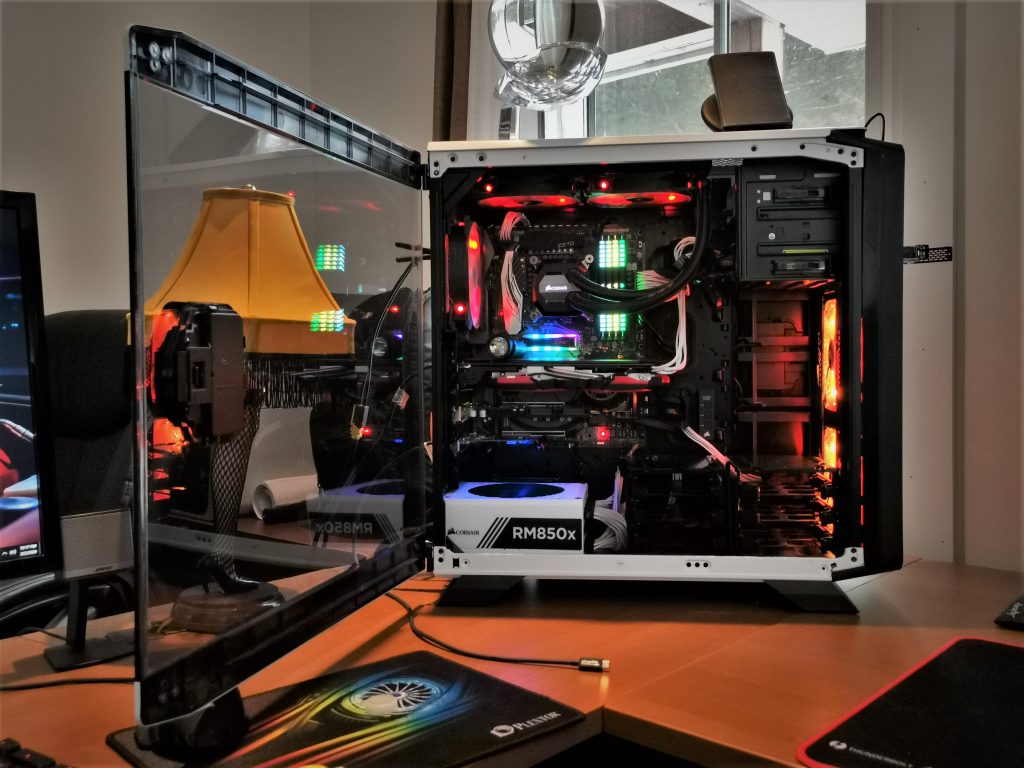TSSDR TEST BENCH AND PROTOCOL
SSD testing at TSSDR differs slightly, depending on whether we are looking at consumer or enterprise storage media. For our Sabrent Rocket Pro 4TB NVMe Portable SSD testing today, our goal is to test in a system that has been optimized with our SSD Optimization Guide. To see the best performance possible, the CPU C states have been disabled, C1E support has been disabled, and Enhanced Intel SpeedStep Technology (EIST) has been disabled.
SYSTEM COMPONENTS
The components of this Test Bench are detailed below. All hardware is linked for purchase and product sales may be reached by a simple click on the individual item. As well, the title is linked back to the individual build article where performance testing can be validated.
TSSDR ASROCK Z370 TAICHI TEST BENCH (link)
| PC CHASSIS: | Corsair Graphite 760T Arctic White Window Chassis |
| MOTHERBOARD: | ASRock Z370 Taichi |
| CPU: | Intel Coffee Lake Core i7-8770K |
| CPU COOLER: | Corsair Hydro Series H110i GTX |
| POWER SUPPLY: | Corsair RM850x 80Plus |
| GRAPHICS: | MSI Radeon RX570 |
| MEMORY: | Corsair Vengeance RGB 32GB DDR4 3600Mhz C18 |
| STORAGE: | Intel Optane 900P 480GB SSD |
| KEYBOARD: | Corsair Strafe RGB Silent Gaming |
| MOUSE: | Corsair M65 Pro Gaming |
| OS | Microsoft Windows 10 Pro 64 Bit |
BENCHMARK SOFTWARE
The software in use for today’s analysis is typical of many of our reviews and consists of Crystal Disk Info, ATTO Disk Benchmark, Crystal Disk Mark, AS SSD, Anvil’s Storage Utilities, and TxBench. Our selection of software allows each to build on the last and to provide validation to results already obtained.
CRYSTAL DISK INFO VER. 8.6.1 x64
Crystal Disk Info is a great tool for displaying the characteristics and health of storage devices. It displays everything from temperatures, the number of hours the device has been powered, and even to the extent of informing you of the firmware of the device.
Crystal Disk Info validates that our external SSD is running in UASP (NVM Express), and also that NVMe 1.3 protocol is in use.
ATTO Disk Benchmark is perhaps one of the oldest benchmarks going and is definitely the main staple for manufacturer performance specifications. ATTO uses RAW or compressible data and, for our benchmarks, we use a set length of 256mb and test both the read and write performance of various transfer sizes ranging from 0.5 to 8192kb. Manufacturers prefer this method of testing as it deals with raw (compressible) data rather than random (includes incompressible data) which, although more realistic, results in lower performance results.
 The SSD Review The Worlds Dedicated SSD Education and Review Resource |
The SSD Review The Worlds Dedicated SSD Education and Review Resource | 


“It is a USB 3.2 Gen 2 SSD that will reach speeds of 1MB/s read and write if you have a compatible system that contains Type-C connectivity.”
It seems like it can do nearly 1000x that speed according to the later pages of the review. 😉
Congratulations! We often covertly disguise the proper spelling of a word to appear improper in order to confirm that, in fact, we still have readership.
Lol…Thanks for the heads up.
You sure do still have a readership. I’ve been checking in here almost every day to see what you have reviewed or published since before you (Sean) reviewed the Crucial MX100 way back when, which is why I bought one (and am still using).
Which brings me to a question for you, Les. I am going to build a new computer based on an AMD processor; however I’m going to install a Linux OS on it instead of Windows. Is there a chance you can keep in mind Linux compatibility when you are doing reviews and writing new articles? Probably most hardware is compatible. Unfortunately they won’t create hardware (SSD) utilities for Linux.
A while back I had thought about asking you to consider writing a SSD optimization guide for Linux, however I figured the BIOS section would remain the same, and since SSDs are getting so fast that the Linux OS part may not be very important.
Thanks for all of the hard work that you continue to do, I definitely appreciate it.
Thank you very much for the comps. Linux. I am sorry but that is not a skill I have in my toolbox, unfortunately.
“Sabrent’s build quality for all of their external SSDs is beyond reproach”
That’s a big stretch, IMO. The machining of their enclosures is great, and the packaging of their drives is really nice, but the 8TB XTRM-Q was released with a serious hardware design flaw. Despite the fact that it only affected some – not all – units, unqualified praise for their build quality is, I believe, uncalled for.
And that’s coming from someone who owns four 4TB XTRMs, one 4TB XTRM-PRO, and two 8TB XTRM-Qs. (Speaking of which, you don’t find the direct to QLC speed to be a significant downside? Perhaps it’s just my use case, which involves very large file transfers, but any time I transfer a significant amount of data the R/W speed drops to what it actually is: somewhere around 300 MB/s.)
For our specific scenario, not a stretch whatsoever. We haven’t got multiple of the same item on hand and have to draw opinion from what we receive and, well, our samples have been beyond reproach. We haven’t encountered or heard of a design flaw. As for QLC R/W speeds dropping, this falls into what we always say about understanding the task at hand for the drive being purchased. We use the 8TB without issue, but understand that if we are going to be moving 2/3/4TB of media in one shot it is going to slow. Don’t get me wrong. I appreciate your comment, but simply have to put out in print my opinion as a reviewer without influence one way or another.